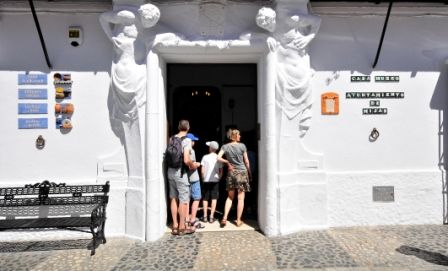Mijas - Historical and Ethnological museum / Folk Museum

Address: Plaza de la Libertad, Mijas
Monday to Sunday: From 10AM to 2PM - from 3PM to 7PM
Tickets: 1 €
Phone: 952 59 03 80
MORE INFORMATION ABOUT THE MUSEUM: Historical-Ethnological Museum (PDF) - See at issuu
Located in the old Town Hall, it recreates the Mijas of yesterdays. Farming tools, fishing tools, oil mills, a wine cellar, Mijas local cuisine, etc. There are also traveling art and local handicrafts exhibitions. In this museum you will also find the replica of the bedroom where Manuel Cortés Quero, "The mole of Mijas" (El Topo de Mijas), was hidden for 30 years.
The Folf Museum alows to the traveler to take a stroll through the ethnographic and historical past of this town, navigating across the countryside and Sierra mijeña, which smell like rosemary and thyme, knowing the secrets of the elaboration of lime Which gives color and protection to the houses of this town, knowing the profits of esparto, the qualities of its honey, the importance of its marble quarries from Roman times, touching the tools with which our ancestors worked this Earth by force of sweat and in exchange for very little, to discover the perfection of the old machinery used for the production of wine and oil, to sum up, the traveler will feel like a local people on his journey through this land, that is our desire, perhaps inherited from a town that centuries ago, before the invention of tourism, walked by these payments.
Creación del museo
The Town Hall of Mijas, through its Delegation of Culture, promoted during the years 1994-1995 the creation of a Museum of ethnographic character where the historic - ethnographic past of this Villa was collected, the result of those efforts culminated in June 1.995 with the opening of the House Museum of the Villa in the building of the Old Town Hall, in the Plaza de la Libertad of this town. Since then, we have continued to work not only on the maintenance of funds and facilities but also on the enrichment of the contents. This is illustrated by the creation in 1997 of a new room dedicated to traditional bakery (Horno Of the Villa) and in 1999 the inauguration of a space dedicated to the oil (Mills of oil) and another to the elaboration of the wine (Wine cellar), also in this same year the contents were reorganized creating Sala Sierra and Sala Campo.
Museum programme
The town of Mijas, eminently agricultural in its origins, underwent a great change in the decade of the 60's due to the tourist development that is given on the Costa del Sol, these changes are noted in all aspects of the life of the town, but it is the anthropological aspect where it is most important, as a result of this date change the ways of life and production of many of the Mijas people then, agricultural and craft work are losing prominence in favor of other activities aimed at meeting the demands That the "tourism boom" demands, such as construction (masonry), gardening, etc.
From the decade of the years 60 to 90, and progressively and relatively rapidly, handicrafts are lost and the close links with the mountains and the countryside as generators of livelihoods, coupled with the ignorance that young people have about The historical-ethnographic past of its own town gives rise to a certain concern in the City Hall that materializes with the gestation of a space where to pick up our past, in this way was born in June 1995 the House Museum of the Villa, an ethnographic museum that serves as Witness of the past work and of the daily history of our ancestors.
As can be seen from the above, the Casa Museo is a historical-ethnographic museum of local scope and the exhibition contents are related to the agricultural, craft and product transformation work carried out in Mijas throughout its long history.
The contents are divided into the following rooms:
"Sala Campo" (Countryside Room)
"Sala Sierra" (Sierra Room)
"Molinos de aceite" (Oil mills)
"La bodega" (The wine cellar)
"La panadería"(The bakery)
"La carpintería"(The carpenter's shop)
"El telar" (The loom)
"La casa Tradicional de Campo" (The Traditional Country House)
Manuel Cortés Quero Room
In addition to the rooms of eminently ethnographic character that have been cited and whose expository contents are permanent there are other dependencies that are listed below:
Projection Room
In it we focus on pedagogical activities, dissemination and other cultural activities with projections of ethnographic videos of local and national scope, courses related to the contents of the Museum, presentations of works, books, ...
Showroom
Dedicated to temporary exhibitions of art, we maintain a stable program with an average of twelve annual exhibitions.
The backyard
Patio of the house where in the summer months we organize cycles of flamenco concerts under the name of "Damos el Cante" with the participation of young guitarists and cantaores as well as other figures already consecrated of flamenco. There are also exhibitions of traveling art and local handicrafts.
